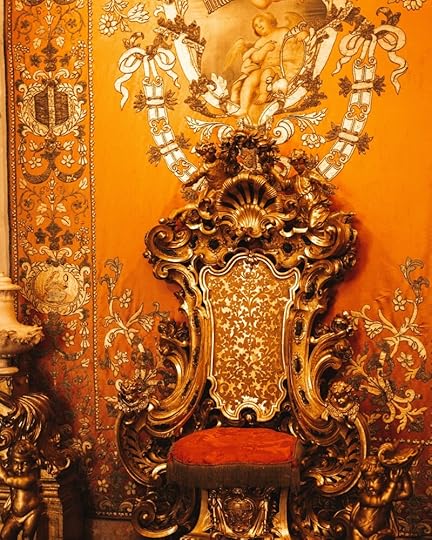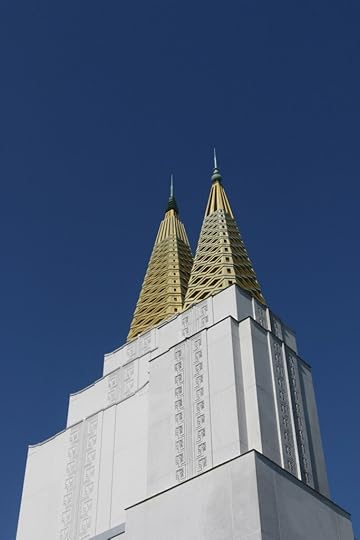I Don’t Want Kingdoms, Thrones, or Dominions

In one of my memories of Primary, I’m around ten years old sitting in a square, windowless classroom. The teacher, Brother L, gestures with his hands in front of the brown chalkboard like he’s a Marvel superhero wielding magic.
“You young men,” he says, “will one day create earths! You’ll take matter from this and matter from that and fuse them together. You’ll have unlimited priesthood power to manipulate elements and build earths!”
I raised my hand. “What will girls get to do?”
Brother L thought about it for a moment, then said carefully, “Earths need flowers. Girls will come up with pretty things and their husbands will make it.”
Boys get all cosmic power but girls get to make eternal pinterest boards for pretty flowers. Sounds about right.
This was far from my last encounter with Mormon men and their subtle power-obsession.
As a young adult, I attended a local fireside with Elder Bednar. At the end of the Q&A meeting, we all stood as we usually would after a church meeting. A huge stake center full of 18-30 year olds did what 18-30 years olds did–we chatted. Gathered our things. Made after meeting dinner plans.
Suddenly, Elder Bednar stood and the organ postlude music cut off. He grabbed the microphone and spoke in an angry voice I’ll never forget.
“How dare you. How dare you all stand and be so noisy after an apostle of the Lord has just spoken with you and left you with his apostolic blessing.”
We were rebuked into immediate silence. He then directed us to sit back down. We rose again after he stood and filed into a quiet line to walk up to the podium and shake his hand before exiting out the back door. You could have heard a pin drop in that chapel. I’ll never forget shaking his hand and feeling a strange sense of disappointment and coldness.
Bednar clearly felt that his status and authority warranted our silence to show respect. He didn’t hesitate to wield his church-given power to admonish us for what he deemed irreverence and for daring to stand before he did. (And I’ve heard through the internet grapevine that this is a typical move for him when members or even his own wife stand before him.)
Through actions and lessons like these over a lifetime, I’ve realized that these are not isolated incidents.

In the 1840s in Nauvoo, Joseph Smith expanded not only his theology, but his kingdom. This was arguably his most fruitful period of religious and political creation. The temple ceremony, plural marriage, revelations, the Nauvoo Legion, running for president––Joseph was busy. After years of being chased from state to state, losing everything, and facing threats on his people and his person, I believe Joseph saw Nauvoo has his redemption.
The new temple rites initiated his inner circle into his loyal court. Plural marriage gave him power over families and women who would bear him posterity. The Nauvoo Legion appointed him a Lieutenant-General, the highest rank possible, held only by George Washington. The Council of Fifty declared him king of the world. Joseph even ran for president in 1844, which they believed would lead to a political kingdom of God.
It makes sense to me that after over a decade of running from the law and mobs that Joseph and many early Saints would crave some power and control over their turbulent lives. I think this was a huge motivation for his actions in Nauvoo, particularly the temple rite. Joseph’s trauma over losing and desiring so much is the bedrock for our dogmas.
At the heart of the Mormon temple rite, both then and today, is a quest for power. It’s a desire for certainty not only in personal and familial salvation, but also proof that we will ultimately triumph over earthly enemies and partake in God’s enormous power ourselves.
It’s about obtaining promises of kingdoms, thrones, powers, dominions, and principalities. It’s about becoming gods and goddesses. It’s about building new worlds and creating never-ending posterity. It’s about ruling and reigning over the house of Israel.
In short, it’s about Joseph finally getting to best the enemies and mobs that took everything from him and the Saints. It’s about men like Bednar feeling secure in their priesthood authority and control over others. It’s men like Brother L building whatever they want with their awesome power.
I’ve heard countless men in the church in both small and big ways declare their thirst for eternal power: temple sealers who go on about the promises of principalities and thrones in the sealing ceremony; bishops at the pulpit preaching about the majesty of becoming gods; Sunday school teachers lecturing on the powers of the priesthood like they’re magic.
It’s interesting to me that I’ve never once heard a woman in the church talk about getting kingdoms, thrones, and dominions like men do. I’ve never heard them wax on about bringing matter together to create a world or gleefully envisioning ruling and reigning forever. When women speak of eternal blessings, they speak of family relationships and eternal love, not kingdoms or godhood.
I don’t think that’s a coincidence. I’m not saying all Mormon men are power-hungry, but I do think that hunger is written into the DNA of our doctrine and taught to our men as acceptable. I don’t think most women engage with the Mormon power narrative in the same way because it was never designed for them.
And when I really sit back and think about it, I wouldn’t even want Joseph’s definitions of power if it was offered to me as a woman.
I don’t want the priesthood man’s ideal of eternal blessings. I don’t want kingdoms, thrones, or dominions. I have no desire to spend eternity ruling and reigning over anyone. I don’t want principalities or the ability to create earths. I’ve no interest in greatness and glory, powers and priesthoods, worlds without end.
I want to spend eternity with everyone, living equally side by side. I envision a world of beauty and personal creation that has nothing to do with superhero-like priesthood powers. I see myself in a small cottage where I love all for who they are, where we work and cry and share together. There are no kingdoms to rule or thrones to sit on. No priesthood men to build the cosmos while I design flowers. There is no hierarchy of leaders that demands my respect without earning it.
Instead, we are all sitting down in the kingdom of God together, as one.
If the Celestial Kingdom is Joseph’s fever dream of ambition and power, then maybe I don’t want it. I don’t want Bednar’s stern rules or Brother L’s small vision of creation. Instead, I set my hopes and faith on a truly equal eternity where there are no titles, no hierarchies, no separations; only Christ-like love.



